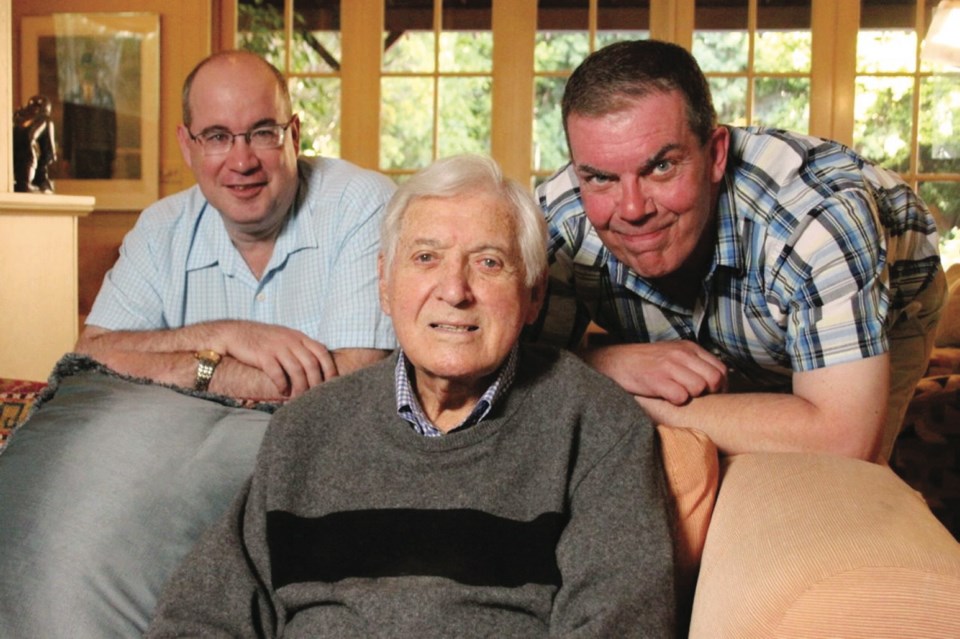How’s this for a game-show question? Where were Shannon Tweed and Monty Hall last seen together?
Victoria Film Festival audiences can learn the answer tonight at the Vic Theatre, when Gone South: How Canada Invented Hollywood makes its B.C. première.
Indeed, it seems surreal that the former Playboy Playmate, model and actor married to Kiss frontman Gene Simmons would even be mentioned in the same sentence as Monty Hall, the legendary 92-year-old Canadian broadcaster and host of Let’s Make a Deal fame.
They’re among a disproportionate number of famous Canucks whose migration to Los Angeles, described as “Canada’s fourth-largest city,” has influenced American pop culture.
It goes back to Hollywood’s infancy, shaped by the vision and tenacity of Canadians such as London, Ont.-born movie mogul Jack Warner; Mack Sennett, the Quebec-born director who discovered Charlie Chaplin; and “America’s Sweetheart” — Toronto-born Mary Pickford.
READ MORE ›› Victoria Film Festival
Directed by Victoria’s Les Bland and Ian Ferguson, Gone South is a witty, colourful and revealing acknowledgement of Canada’s historic contributions. It’s bookended by a contrived conceit featuring Canadian singer-songwriter Tracy Thomas trying to musically make her mark in L.A. While she intermittently interacts with recognizeable Canucks, the documentary mostly savours revealing input from familiar faces, intercut with whimsical live-action, animation and archival footage.
The self-mocking Canadians include Neve Campbell, Howie Mandel, Erin Karpluk, Victoria exports Calum Worthy and Beau Mirchoff, Jeopardy host Alex Trebek, producers Joe Medjuck and House creator David Shore, directors Arthur Hiller and Ted Kotcheff, musician David Foster, Alan Thicke, Tommy Chong, David Thomas and Harland Williams.
Tweed’s reaction when she called me this week, while I was at Tim Hortons, was typical of the nostalgic affection for Canada expressed on screen.
“I’m so envious,” she laughed. “I want a double-double!”
Tweed’s footage was filmed last year at the lavish Beverly Hills home she shares with Simmons.
Bland, a huge Kiss fan, could barely disguise his excitement at being in the home.
“Was it because he tried Gene’s boots on?” she quipped. “Or maybe it was because he was sticking his tongue out at me.”
While the Newfoundland-born, Saskatoon-raised star took some heat for moving to the U.S. 34 years ago, she says she has no regrets.
“It was a different time,” emphasizes Tweed, noting she had to use “dirty payphones” in L.A. to book auditions before the Internet and cellphones proliferated.
“You’re either going to survive or you’re not, and everybody does the best they can with what they have.”
After the success of her 1984 teen sex comedy Hot Dog . . .The Movie, Tweed became best known for her appearances in erotic thrillers such as Illicit Dreams and Indecent Behaviour 3.
“Anybody who makes money off their looks was going to take the heat, and I didn’t go to film school,” she said. “But I’m not going to accept the heat.”
Tweed says her goal wasn’t to leave Canada, but to make the kind of money not being offered at home.
“I’d gladly have accepted better offers had they come my way in Canada,” she said.
Admitting some choices weren’t the best, she says she “created some pathways for other people, and that’s OK, too.”
It bothers her she was called a soft-porn star for doing nudity, however.
“Look what they’re doing now!” laughed Tweed. “On series TV there’s more nudity than I ever did. I never had real sex on camera.”
Tweed, 57, has maintained her sense of humour, noting she was both dumfounded and flattered that she was recently invited to audition for a role as a younger woman in a Viagra commercial.
Winnipeg-born Hall agrees with Tweed’s philosophy that there’s nothing like Canadian perseverance to help you survive in showbiz.
“You try like mad to get some appointment and make 50 phone calls and finally get one,” said Hall, flashing back to his days pounding the pavement looking for work after moving from Toronto to New York.
“Then the guy says, ‘What’s your name?’ and I say ‘Monty Hall,’ ” he recalled.
‘Oh, you’re from Montreal!’ ” he added, mimicking a distracted American producer’s reaction.
“No, I’m Monty Hall,” he would say.
“OK, Marty,” replied the dismissive producer.
It’s no wonder Hall says showbiz should be renamed Rejection.
“I mean, you become so small you feel two-inches high,” he said. “They bring you down to Earth very quickly.”
Ironically, before we spoke, Hall had just had lunch with director Arthur Hiller, the old friend he had dinner with before moving to the U.S. decades ago.
He used to have reunions with members of their “little Canadian gang” in L.A. that included Lorne Greene, Norman Jewison and Lloyd Bochner.
“[Canadians] just flooded Hollywood after that,” Hall said. “Now if you had a reunion, you’d have to hire a stadium.”
Hall hosted 4,300 episodes of Let’s Make a Deal, still on the air with new host Wayne Brady, 51 years after Hall sold it to NBC.
“It wasn’t easy back then,” he recalled. “When you’d say you were from Canada, they’d say, ‘We thought all you had were Royal Canadian Mounted Police and hockey players up there.’ ”
Hall, who with a laugh says he occasionally visits the L.A. set of Let’s Make a Deal with notes “they pay no attention to,” is still a Winnipeg boy at heart, he said.
“When Canada plays the U.S. in Olympic hockey, who do you think I’m pulling for?” he said.
